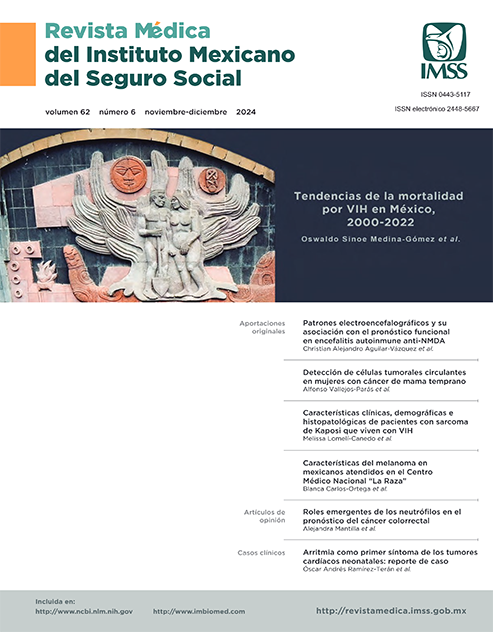Impacto del COVID-19 en la enfermedad biliar: presentación en cirugías pospuestas
##plugins.themes.themeEleven.article.main##
Palabras clave
Enfermedades de los Conductos Biliares, Vesícula Biliar, Procedimientos Quirúrgicos del Sistema Biliar, Virus del SRAS, Pandemias / Bile Duct Diseases, Gallbladder, Biliary Tract Surgical Procedures, SARS Virus, Pandemics
Resumen
Introducción: desde que el brote de COVID-19 escaló a niveles pandémicos, numerosos hospitales pospusieron intervenciones electivas. Los estudios que reportan la incidencia, presentación, gravedad y manejo quirúrgico de la patología biliar difieren antes, durante y después de la pandemia.
Objetivo: evaluar la presentación de la patología biliar por medio de diagnóstico y Escala de Parkland en pacientes que sus cirugías fueron pospuestas por la pandemia y posteriormente se intervinieron quirúrgicamente.
Material y métodos: se realizó un estudio retrospectivo. Se incluyeron pacientes con diagnóstico de patología biliar que contaban con programación quirúrgica y posteriormente cancelada durante la pandemia. Se utilizó t de Student y Chi cuadrada en análisis estadístico.
Resultados: se evaluaron un total de 520 pacientes. La colelitiasis fue el diagnóstico más común en 74.4%. El grado III en la Escala de Parkland fue el más prevalente (43.7%). Se observaron diferencias significativas entre sexos (p = 0.000) y entre cirugías de urgencia frente a electivas (p = 0.000) en relación con la Escala de Parkland. El tiempo de hospitalización fue significativo entre cirugías de urgencia y electivas (p = 0.000).
Conclusión: la mayoría de los pacientes presentaron grado III en la Escala de Parkland, lo que refleja un aumento de un nivel en comparación con la prevalencia en la literatura prepandémica. Más estudios son necesarios para valorar el impacto real de la pandemia sobre la patología biliar.
Referencias
World Health Organization. Coronavirus disease (COVID-19) pandemic [Internet]. World Health Organization. [citado 2024 Mayo 30]. Disponible en: https://www.who.int/europe/emergencies/situations/covid-19.
Muñoz Leija MA, Zarate Garza PP, Jacobo Baca G, et al. Modifications to the delivery of a gross anatomy course during the COVID-19 pandemic at a Mexican medical school. Eur J Anat. 2020;24(6):507-12.
Said-Degerli M, Hogir A, Kandaz OF, et. Al. How correct is the postponed cholecystectomy during the coronavirus disease-19 pandemic process? Gallstone ileus is not a myth anymore. Cir Cir. 2021;89(3):390-3. doi: 10.24875/CIRU.21000043.
Johan-Drott C, Sandblom G, Österberg J, et al. Fler akuta gallstensoperationer och färre elektiva under pandemin:[Swedish gallstone surgery during the covid-19 pandemic]. Läkartidningen. 2022;119.
Bagepally BS, Haridoss M, Sasidharan A, et al. Systematic review and meta-analysis of gallstone disease treatment outomes in early cholecystectomy versus conservative management/delayed cholecystectomy. BMJ Open Gastroenterol. 2021;8(1):e000675. doi: 10.1136/bmjgast-2021-000675.
Cawich SO, Mahabir AH, Griffith S, et al. Time to abandon the old dictum of delayed laparoscopic cholecystectomy after acute cholecystitis has settled in Caribbean practice. Trop Doct. 2021; 51:539-541. doi: 10.1177/00494755211010002.
Vallès KF, Neufeld MY, Caron E, et al. COVID-19 pandemic and the cholecystitis experience at a major urban safety-net hospital. J Surg Res. 2021;264:117-23. doi: 10.1016/j.jss.2021.02.037.
Murphy MC, Dempsey PJ, Gillespie CD, et al. Increased incidence of acute calculous cholecystitis observed during COVID-19 social restrictions. Ir J Med Sci. 2022; 191(1):229-232. doi: 10.1007/s11845-021-02587-2.
Greenberg AL, Schwartz H, Collins CR, et. al. Emergency general surgery utilization and disparities during COVID-19: an interrupted time-series analysis. Trauma Surg Acute Care Open. 2021;6(1):e000679. doi:10.1136/tsaco-2021-000679.
Cochrun Jr SL, Finnegan T, Kennedy GE, et al. A retrospective single-institution review of the impact of COVID-19 on severity of biliary disease. Am J Surg. 2023;225(2):352-6. doi: 10.1016/j.amjsurg.2022.09.047.
World Health Organization. Statement on the fifteenth meeting of the IHR (2005) Emergency Committee on the COVID-19 pandemic [Internet]. World Health Organization. [citado 2024 Mayo 30].
McBenedict B, Hauwanga WN, Petrus D, et al. The Impact of the COVID-19 Pandemic on Surgical Services in Brazil›s Healthcare System: A Retrospective Cross-Sectional Study. Cureus. 2023;15(9):e44693. doi: 10.7759/cureus.44693.
Martínez-Caballero J, González-González L, Rodríguez-Cuéllar E, et al. Multicentre cohort study of acute cholecystitis management during the COVID-19 pandemic. Eur J Trauma Emerg Surg. 2021;47:683-92. doi: 10.1007/s00068-021-01631-1.
Sakong D, Choe MS, Nho WY, et al. Impact of COVID-19 outbreak on acute gallbladder disease in the emergency department. Clin Exp Emerg Med. 2023;10(1):84-91. doi: 10.15441/ceem.22.239.
Kao LS, Ball CG, Chaudhury PK, et al. Evidence-based reviews in surgery: early cholecystectomy for cholecystitis. Ann Surg. 2018268(6):940-2. doi: 10.1097/SLA.0000000000002867.
Rutledge D, Jones D, Rege R. Consequences of delay in surgical treatment of biliary disease. Am J Surg. 2000;180(6):466-9. doi:10.1016/s0002-9610(00)00520-1.
Prieto M, Ortega I, Balibrea JM, et al. Management of cholelithiasis in times of COVID-19: A challenge for the system. Cir Esp. 2021;99(9):699-700. doi: 10.1016/j.cireng.2021.05.013.
Farber ON, Gomez GI, Titan AL, et al. Impact of COVID-19 on presentation, management, and outcomes of acute care surgery for gallbladder disease and acute appendicitis. World J Gastrointest Surg. 2021;13(8):859-870. doi: 10.4240/wjgs.v13.i8.859.
Rangel-Olvera G, Alanis-Rivera B, Trejo-Suarez J, et al. Intraoperative complexity and risk factors associated with conversion to open surgery during laparoscopic cholecystectomy in eight hospitals in Mexico City. Surg Endosc. 2022;36(12): 9321-93288. doi: 10.1007/s00464-022-09206-w.
Madni TD, Leshikar DE, Minshall CT, et al. The Parkland grading scale for cholecystitis. Am J Surg. 2018;215(4):625-30. doi: 10.1016/j.amjsurg.2017.05.017.
Lee W, Jang JY, Cho JK, et al. Does surgical difficulty relate to severity of acute cholecystitis? Validation of the parkland grading scale based on intraoperative findings. Am J Surg. 2020; 219(4):637-41. doi: 10.1016/j.amjsurg.2018.12.005.
Piltcher-da-Silva R, Castro TL, Trapp AG, et al. The impact of COVID-19 and social avoidance in urgent and emergency surgeries-will a delay in diagnosis result in perioperative complications?. Rev Assoc Med Bras. 2021;67:355-9. doi: 10.1590/1806-9282.20201000.
Gunasekaran G, Naik D, Gupta A, et al. Gallbladder perforation: a single center experience of 32 cases. Korean J Hepatobiliary Pancreat Surg. 2015;19(1):6-10. doi: 10.14701/kjhbps.2015.19.1.6.
Sisa-Segovia CG, Guggiari B, Cacace K, et al. Aplicación de la escala de Parkland en colecistectomías videolaparoscópicas. Cir Parag. 2022;46(2):7-11. doi: 10.18004/sopaci.2022.agosto.7.
Baral S, Chhetri RK, Thapa N. Utilization of an intraoperative grading scale in laparoscopic cholecystectomy: a nepalese perspective. Gastroenterol Res Pract. 2020;2020:8954572. doi: 10.1155/2020/8954572.


